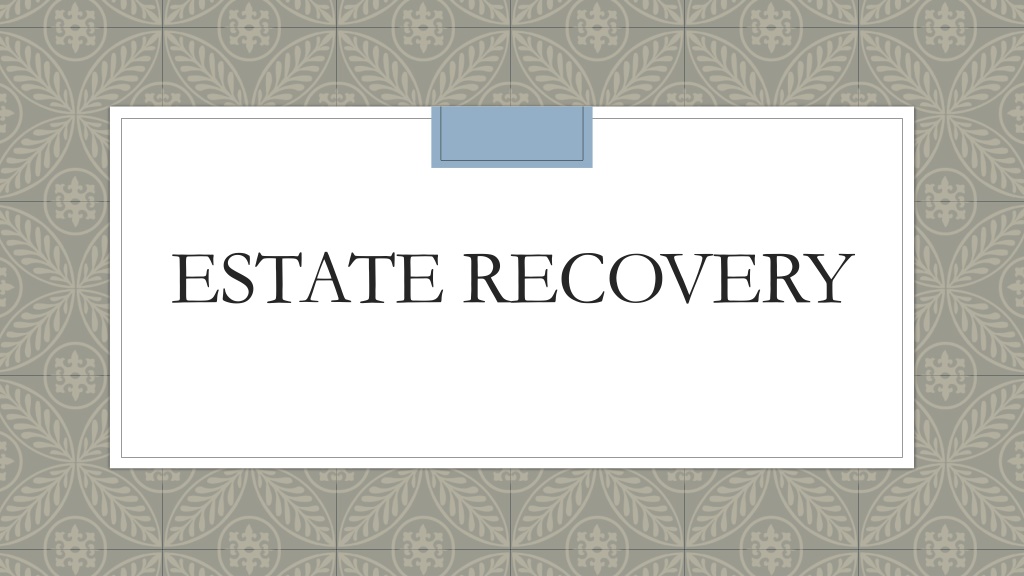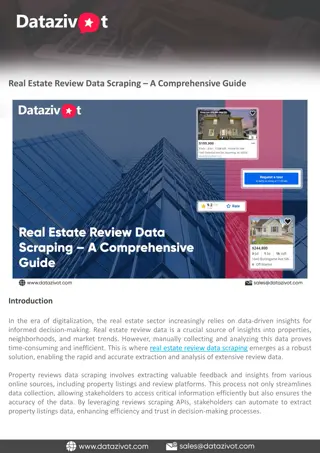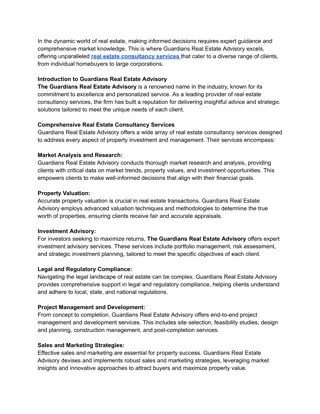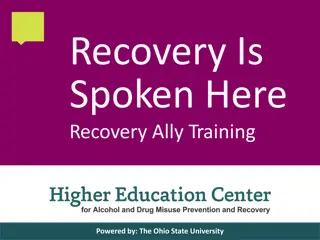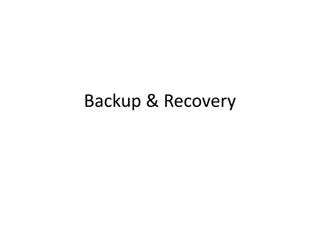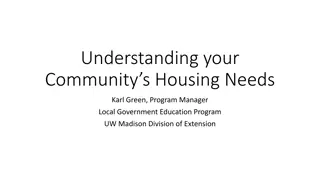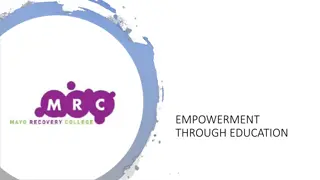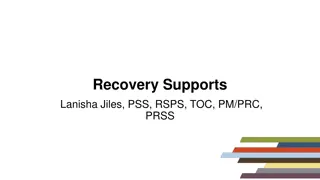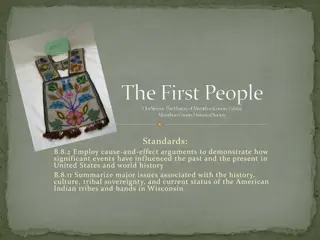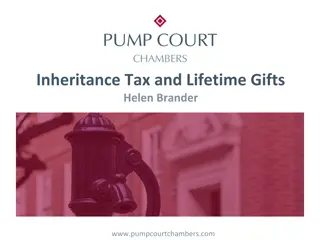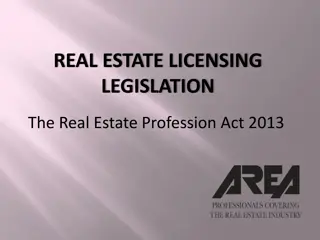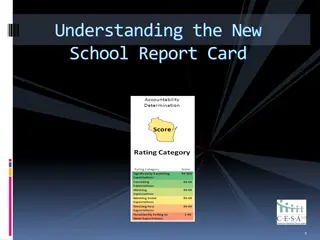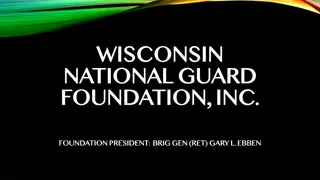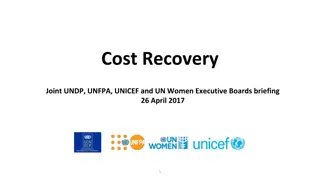Understanding Estate Recovery in Wisconsin: A Comprehensive Guide
The concept of estate recovery involves the process of recovering Medicaid expenditures from the estates of deceased beneficiaries. This guide explores the definition of an estate, outlines the sources of law and information relevant to estate recovery, and delves into the specifics of estate recovery in Wisconsin, including the implementation of Medicaid estate recovery laws and exemptions for certain programs and services. Understanding estate recovery is crucial for individuals navigating the complexities of estate planning and administration.
Download Presentation

Please find below an Image/Link to download the presentation.
The content on the website is provided AS IS for your information and personal use only. It may not be sold, licensed, or shared on other websites without obtaining consent from the author. Download presentation by click this link. If you encounter any issues during the download, it is possible that the publisher has removed the file from their server.
E N D
Presentation Transcript
Sources of Law/Information MEH Estate Recovery Handbook https://www.dhs.wisconsin.gov/publications/p1/p13032.pdf Wisconsin Statutes, Chapter 49 Federal Law, 42 USC 1396 DHS Operation Memos Case Law, Fair Hearing decisions
What is an Estate? An estate includes all assets (money and property) owned by an individual at the time of death, including any solely owned savings or checking accounts, stocks, savings bonds, personal property, and real estate. After someone dies, all of his/her assets go to his/her estate and are administered by the Personal Representative. The Personal Representative Any person authorized to administer a decedent s estate. Evidence of this authorization is found in Domiciliary Letters granted by the court or by the Probate Registrar. A personal representative may be nominated in a Will or Codicil. Probate: Technically speaking, probate is the proof of the validity of a Will in court proceedings and the probate of the assets of a decedent involves the process of administering the assets as directed under the Will. However, probate or probate administration are terms often associated with administration of the property of persons who have died intestate (leaving no Will), as well as the property of minors, persons determined to be incompetent, and persons unwilling or unable to manage their income or assets.
So What is Estate Recovery? 1965: Medicaid program began states were permitted to recover from estates of deceased beneficiaries over age 65 who had no surviving spouse, minor child or adult disabled child 1993: Federal law mandating states implement ER (OBRA 93) - At a minimum, states must recover from assets that pass through probate (which is governed by state law). At a maximum, states may recover any assets of the deceased recipient. Act 20: Wisconsin now have enhanced ER effective August 1, 2014 https://aspe.hhs.gov/basic-report/medicaid-estate-recovery
1. False No ER for QMB Programs subject to Estate Recovery MEH 22.1.2 Medicaid services received while living in a nursing home or institutionalized in an inpatient hospital Certain home health services received by members age 55 or older (skilled nursing, home health aide, home health therapy and speech pathology, private duty nursing, personal care services) All services received by members age 55 or older in a long-term care program, including: FamilyCare, COP, CIP, Brain Injury Waiver, IRIS, PACE, Community Opportunities and Recovery, Community Supported Living Arrangements Wisconsin Chronic Disease Program LTC Medicaid
Not Subject to Estate Recovery Medicaid Card Services MSP s Medicare Plans under the ACA
2. True - Spouses Estate is Subject to ERP Starting 8/1/2014 recovery can be pursued against 50% of surviving spouse s estate The presumption is that 100% of the property in the estate of surviving spouse was marital property The presumption can be rebutted Martial property laws chapter 766 of Wisconsin Statutes
3. True Non-Probate assets are subject to ER Act 20 What are non-probate assets? Life insurance, revocable trusts, life estates, annuity benefits Wis. Stat. 49.849(1)(d) "Property of a decedent" means all real and personal property to which the recipient held any legal title or in which the recipient had any legal interest immediately before death, to the extent of that title or interest, including assets transferred to a survivor, heir, or assignee through joint tenancy, tenancy in common, survivorship, life estate, revocable trust, or any other arrangement, excluding an irrevocable trust.
4. False, but a little true ER does not take action until after a person s death (so would technically be estate s home). Use of liens placed on real property No lien will be enforced while a surviving spouse, minor child, or adult disabled child lives in the home.
5. False ER does not have to make a claim in court ER may make a claim in probate court, if an estate goes through probate Transfer by Affidavit Lien on real property
6. False ER claim is not before funeral expenses Wis. Stat. 859.25: Priority of Payments If the applicable assets of the estate are insufficient to pay all claims and allowances in full, the personal representative shall make payment in the following order: (a) Costs and expenses of administration. (b) Reasonable funeral and burial expenses. (c) Provisions for the family of the decedent under ss. 861.31, 861.33 and 861.35. (d) Reasonable and necessary expenses of the last sickness of the decedent, including compensation of persons attending the decedent. (e) All debts, charges or taxes owing to the United States, this state or a governmental subdivision or municipality of this state. (f) Wages, including pension, welfare and vacation benefits, due to employees which have been earned within 3 months before the date of the death of the decedent, not to exceed $300 in value to each employee. (g) Property assigned to the surviving spouse or surviving domestic partner under s. 861.41. (h) All other claims allowed.
Lets Take a Closer Look Reasonable funeral and burial costs, including but not limited to: Necessary funeral home charges. Necessary cemetery charges. One headstone/vase/marker and engraving. One funeral meal. Flowers. Telephone calls related to the funeral. Postage related to the funeral. Stipend for clergy, organist and soloist (does not include donations made in memory of the deceased). Obituary and Death Certificates. Transportation of the deceased s remains.
Other costs that come before ER Estate administration costs, which include: Attorney fees. Personal representative fee (2% of the total estate assets). Postage and telephone calls. Copying and forms costs. Mileage (at the Internal Revenue Service rate) related to administration of the estate. Other allowable expenses include: Guardian fees approved by the court. The last month s nursing home patient liability amount.
What are Lower Priority (ER paid first)? Funeral-Related: Travel to attend the funeral (including airfare, hotels, car rental, meals, etc.) Gifts; will bequests Masses; memorials Autopsy Other Payment for services provided prior to the death, or purchases prior to the death. These should have been collected at the time the service was provided. Any amount due to a hospital or nursing home for a private room Medical bills https://www.dhs.wisconsin.gov/publications/p1/p13009.pdf
7. True there is a Procedure to Request a Hardship Waiver Mandated by federal law DHS 108.02 (12) Wis. Admin. Code An heir, beneficiary, or co-owner may apply for waiver of the Department s claim on their portion of the estate for one of the following reasons: Would become or remain eligible for SSI, BC+, Foodshare or Medicaid if Department pursued claim. Estate includes real property used in business, such as a working farm, and recovery by Department could affect person s livelihood. Person is receiving general relief, relief to needy Indian persons (RNIP) or veterans benefits based on need pursuant to Wis. Stat. 45.40(1m) 45 days to apply for Hardship Waiver
Hardship Waiver contd Department only considers information submitted within 45-day timeframe Waiver must include: a. The relationship of the waiver applicant to the decedent and copies of documents establishing that relationship; and b. The criterion under which is the basis for the application and documentation supporting the waiver applicant's position A person may appeal the Department denial of waiver request (again 45 day deadline). The only issue to be considered is whether the Department s decision was correct based on information received at the time. No other information can be heard unless there is showing of good cause.
8. True but Limited Scope Fair Hearing requests in ER 1) FH to review denial of Hardship Waiver request 2) FH after receiving Affidavit on the extent and fair market value of recipient s interest in the property 3) FH if person feels statutory requirements have not been met for filing a lien on real property
9. False If a person does not hand over property to the Department or request a FH, then the Department may bring an action to enforce its right to collect from the property or may issue an order to compel transmittal of the property. A person can appeal the issuance of the order by requesting a review by the Division of Hearings and Appeals. The only issue is whether the person has transmitted the property to the Department. If a person fails to transmit the property after the order has been issued, the Department may present a certified copy of the order to circuit court and the circuit court shall without notice render judgment in accordance with the order.
10. True 22.1.5.10 Voluntary Recovery (ERP) When a member age 55 or older wishes to pay an amount to Medicaid to maintain Medicaid eligibility, prepay a Medicaid deductible, or reduce a potential claim in an estate, forward the payment to ERP. First check BVCI to make sure there is not an outstanding Medicaid claim for an overpayment since the money should be applied to an overpayment first. Voluntary payments, except for prepayment of a deductible, may only be up to the amount of Medicaid paid to date. (See Section 22.1.10 Voluntary Recovery (Not ERP) for voluntary recoveries for members under age 55.) These refunds will be credited to the member and will be used to offset any claim that may be filed in the member s estate. Advise heirs and beneficiaries of deceased members who wish to make a voluntary refund to call ERP staff.
